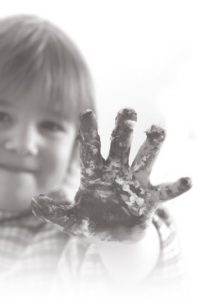Sometimes it’s hard to find the words to say how we feel. Our team of Creative Therapists offer art, music, play and drama to help express and understand your feelings.

Your Creative Therapist may help you to
- Discover what you are communicating through your use of art, music, play or drama
- Develop a better understanding of yourself and your situation
- Develop an understanding of how you relate to others around you
Working alongside the Creative Therapy team, our most experienced counsellors and psychotherapists support young people through the care and youth justice systems.
We also provide therapy for people whose parents or friends may have issues with their sexual identity, or who may themselves have concerns about sexuality. We also work a lot with young people who have survived bullying, violence and abuse, and young people who may be new residents to NI or from ethnic minorities. So even if you feel unable to talk about issues that are very distressing, we will make every effort to make sure you feel understood.
Creative Art Therapists work with groups or individuals who may find it hard to talk.
Click here to download our flyer on Creative Therapy for Post Primary
Click here to download our flyer for Primary Special Needs
Play Therapy for Children: When It’s Hard to Talk
To understand children, to find an approach to them, it is necessary to look at the child from a developmental point of view. They should not be regarded as small adults. Their world really exists, and they talk about it in the game. Unlike adults, the natural environment of communication for a child is play and a variety of activities.
Play is the only central activity of a child that takes place at all times and among all peoples. Children don’t need to be taught to play; no need to force them to play. Children play spontaneously, willingly, with pleasure, without pursuing any specific goals. In order to make it easier to accept children’s play, some adults try to find a special meaning in it, calling it work.
What is a game for children is a way to learn what no one can teach them. This is a way to explore and navigate in the real world, space and time, things, animals, structures, people. By engaging in the process of play, children learn to live in our symbolic world – the world of meanings and values, at the same time exploring, experimenting, learning.
Play therapy NI is the most natural and effective form of working with children, therapy during play. This psychotherapeutic approach is used to help children work through their psychological problems and emotionally traumatic experiences, or overcome behavioral and developmental problems. In the process of therapy, the child begins to better understand his feelings, develops the ability to make his own decisions, and increases self-esteem and communication skills.
Play therapy NI satisfies the child’s need for physical activity; in play, children consume energy, prepare for responsibilities in adulthood, overcome difficulties and free themselves from frustration. They feel physical contact, satisfy their need for competition, respond to aggression in a socially acceptable manner, and learn to interact with other people.
Play helps children to free their imagination, master cultural values and develop certain skills. When children play, they express their own personality and come closer to the inner resources that can become part of their personality. Play for a child is a bridge between concrete experience and abstract thinking, and it is the symbolic function of play that is especially important. In play, a child at the sensorimotor level demonstrates with the help of specific objects that are a symbol of something else, that he or she has ever experienced, directly or indirectly. Sometimes this connection is quite obvious, and sometimes it can be distant. In any case, the play represents an attempt by children to organize their experience, and perhaps play is associated with those rare moments in children’s lives when they feel safer and more in control of their own lives.
Play gives concrete form and expression to the child’s inner world. An emotionally important experience gets meaningful expression in the game. The main function of the game is to transform something not imaginable in real life into manageable situations. This is done through symbolic representation, which gives children the opportunity to learn to cope with difficulties by immersing themselves in self-exploration. The therapist uses play therapy because play for the child is a symbolic language for self-expression. By manipulating toys, children can show more adequately than verbally how they relate to themselves, to significant adults, to events in their lives.
Children’s play can be more fully appreciated if we recognize that it is a means of communication for them. Children express them-selves more fully and more directly in spontaneous, self-initiated play than in words since they feel more comfortable in play. For children, “acting out” their experiences and feelings is the most natural dynamic and health-improving activity they can do.
Play provides the child with the means to resolve conflicts and convey feelings. Toys equip the child with suitable means since they are, without a doubt, the environment in which the child can express him-/herself. Here, feelings and attitudes that the child may be afraid to express openly can, without fear, be projected onto a toy of their own choosing. Instead of verbally expressing feelings and thoughts, the child can bury or shoot a dragon, or spank a doll that replaces a little brother.
Most normally developed children are faced with problems in life that seem insoluble. But by playing them the way he/she wants, the child can gradually learn to cope with them. Children often do this using symbols that they themselves cannot always understand – this is how they react to processes taking place in the inner plane, the roots of which can go deep into the unconscious. The result may be a game that at the moment seems to us to be meaningless or even unpleasant since we do not know what purpose it serves and how it will end.
Play is the children’s attempt to organize their experience, their personal world. In the process of playing, children experience a sense of control over the situation, even if real circumstances contradict this: In play, children turn to their past, constantly reorienting themselves to the present in the process of playing. They play out past experiences, dissolving them in new perceptions and new patterns of attitude. Thus, children continuously discover for themselves anew, revising their self-image, capabilities and responsibilities, changes in their relationship with the world.
Play psychotherapy and NI talk therapy take place in the presence of a therapist-psychologist, who in the process of play identifies the child’s problems and their causes and helps him/her cope with them. The psychologist often involves the child’s parents in the game if it is necessary to teach the parents to play with him/her or to improve their interaction.
Play therapy is considered creative counselling that will help to cope with such problems of your child as:
- increased aggression;
- anxiety;
- fears;
- low self-esteem;
- fear of failure;
- problems with studies;
- problems in relationships with peers;
- excessive emotional stress;
- experiences associated with the divorce of parents, etc.
During play therapy, your child will be able to:
- cope with trauma and current problems;
- express, overcome and resolve their problems, traumas, ac-cumulated emotional experiences and difficulties;
- become more self-confident;
- express their emotions in an adequate and safe way;
- become more benevolent, calm, happy and cheerful.
The method of play therapy is used both in group and in individual form.


